Alright, let’s cut through all the confusion and get straight to what actually works. You’ve probably read bits and pieces about prostate health scattered across different articles, heard conflicting advice from friends, or gotten overwhelmed by medical jargon that doesn’t help you figure out what to do on Monday morning.
Here’s the deal – we’ve done the heavy lifting for you. We’ve gathered 101 real, actionable tips that don’t require a medical degree to understand or a complete life overhaul to implement. These aren’t vague suggestions like “eat better” or “exercise more.” We’re talking about specific, practical steps you can take today, tomorrow, and every day after that.
Some of these tips will surprise you (who knew your sitting position mattered?), others will confirm what you suspected (yes, that daily stress is affecting more than just your mood), and a few might even save you from bigger problems down the road. The best part? You don’t need to tackle all 101 at once – pick the ones that make sense for your life right now and build from there.
Whether you’re 30 and thinking ahead, 50 and starting to pay attention, or anywhere in between, this isn’t just another health list you’ll bookmark and forget. This is your practical playbook for taking real control of your prostate health. Ready to dive in?
Dietary Recommendations
Your Prostate’s Best Friends: The Foods That Actually Make a Difference
Let’s be honest – most guys don’t think much about their prostate until something goes wrong. But here’s the thing: what you eat today can seriously impact your prostate health down the road. The good news? You don’t need some complicated diet overhaul. Just adding the right foods to your plate can be a game-changer for keeping your prostate happy and healthy.
Think of it this way – your prostate is working 24/7, and like any hardworking part of your body, it needs the right fuel to stay in top shape. The foods we’re about to dive into aren’t just nutritious; they’re like a protective shield for one of your most important organs.
Ready to discover which everyday foods can become your prostate’s best allies? Let’s dig in.
1. Tomatoes
Packed with lycopene, tomatoes are a powerhouse for prostate health. This antioxidant fights oxidative stress and may lower prostate cancer risk. Enjoy them cooked in sauces or soups to boost lycopene absorption.
- Rich in lycopene
- Antioxidant properties
- Supports prostate health
2. Cruciferous Vegetables
Broccoli, kale, and cauliflower are loaded with sulforaphane, a compound that may reduce prostate cancer risk. Incorporate them into your meals to harness their protective benefits.
- Contains sulforaphane
- May reduce cancer risk
- Supports prostate health
3. Berries
Strawberries, blueberries, and raspberries are rich in antioxidants that combat oxidative stress. Adding them to your diet can help protect prostate cells from damage.
- High in antioxidants
- Combats oxidative stress
- Protects prostate cells
4. Fatty Fish
Salmon, mackerel, and sardines are excellent sources of omega-3 fatty acids, which have anti-inflammatory properties. Regular consumption may support overall prostate health.
- Rich in omega-3s
- Anti-inflammatory effects
- Supports prostate health
5. Green Tea
Rich in catechins, green tea has been linked to a reduced risk of prostate cancer. Drinking a cup or two daily can provide protective benefits.
- Contains catechins
- Reduces cancer risk
- Protective benefits
6. Pumpkin Seeds
High in zinc, pumpkin seeds play a crucial role in maintaining prostate health. A handful daily can support prostate function and reduce inflammation.
- High in zinc
- Supports prostate function
- Reduces inflammation
7. Pomegranate
Packed with polyphenols, pomegranate may inhibit prostate cancer growth. Drinking pure pomegranate juice or adding seeds to meals can be beneficial.
- Contains polyphenols
- Inhibits cancer growth
- Supports prostate health
8. Garlic
Garlic contains compounds that may help reduce the risk of prostate cancer and has anti-inflammatory properties that benefit the prostate. Incorporate garlic into your meals to enjoy these benefits.
- Contains anti-inflammatory compounds
- May reduce cancer risk
- Supports prostate health
9. Legumes
Beans, lentils, and peas are excellent sources of fiber, protein, and other nutrients. Including them in your diet may help suppress tumor growth and support overall prostate health.
- High in fiber
- Rich in protein
- Supports prostate health
10. Whole Grains
Brown rice, oats, and quinoa are high in fiber, which can lower the risk of prostate issues by aiding digestion and promoting heart health. Incorporate these grains into your meals for added benefits.
- High in fiber
- Aids digestion
- Promotes heart health
Section Recap
We’ve covered essential dietary recommendations to boost your prostate health. Incorporating nutrient-rich foods like tomatoes, green tea, and omega-3 fatty acids can help you on your journey to better prostate wellness.
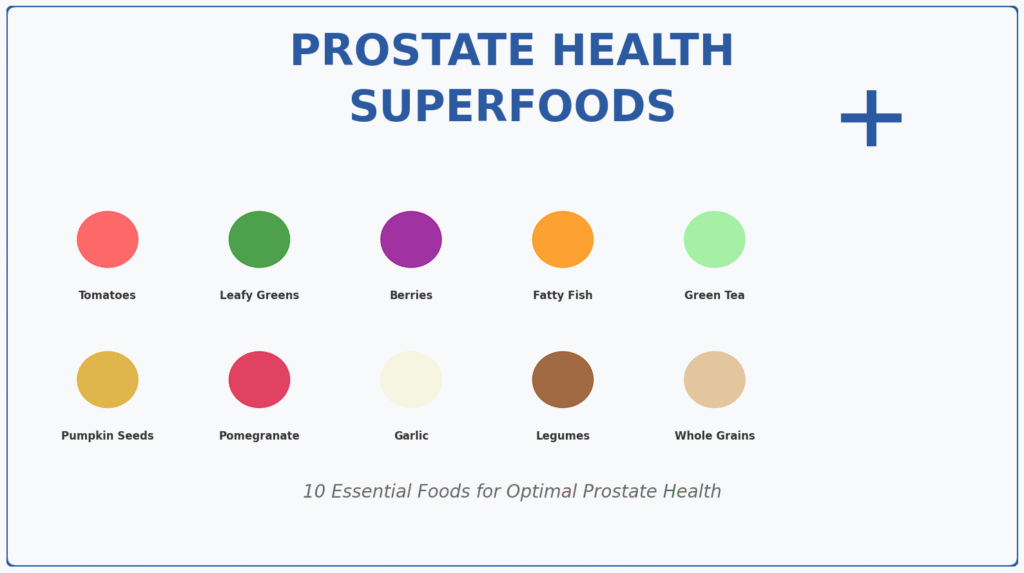
>>Shop Prostate Health Supplement Here<<
Physical Activity
Get Moving for Your Prostate: The Workouts That Actually Work
Here’s something most guys don’t realize – your prostate absolutely loves it when you move. We’re not talking about becoming a gym rat overnight, but getting your body active in the right ways can be one of the smartest things you do for your prostate health.
Think about it: when you’re sitting all day, everything down there gets compressed and circulation slows down. Your prostate? It’s basically holding its breath. But when you get moving, blood flows better, inflammation drops, and your whole pelvic region gets the TLC it deserves.
The best part? You don’t need fancy equipment or a personal trainer. Some of the most prostate-friendly exercises are things you can do right in your living room or backyard. Whether you’re 35 or 65, there are simple, effective ways to get your body working for your prostate instead of against it.
Let’s break down the exercises and activities that can make a real difference – because your prostate will thank you for every step, stretch, and rep.
11. Cobbler Pose
Feel the tension melt away as you sit with your feet together and knees apart. This yoga pose opens up the pelvic area, enhancing blood flow to the prostate. Regular practice can alleviate discomfort and improve urinary function.
- Opens pelvic area
- Enhances blood flow
- Alleviates discomfort
12. Hero Pose
Kneel and sit back between your heels to stretch your thighs and knees. This pose boosts circulation in the pelvic region, supporting prostate health. Holding it for a few minutes daily can promote relaxation and reduce pelvic tension.
- Stretches thighs and knees
- Boosts pelvic circulation
- Reduces pelvic tension
13. Bridge Exercise
Lie on your back, lift your hips to form a straight line from shoulders to knees. This movement strengthens the glutes and lower back, supporting pelvic health. Incorporate it into your routine to enhance stability and alleviate prostate-related discomfort.
- Strengthens glutes and lower back
- Supports pelvic health
- Enhances stability
14. Squats
Stand with feet shoulder-width apart, lower your body as if sitting in a chair. Squats engage pelvic floor muscles, improving bladder control and reducing prostate enlargement symptoms. Aim for 10–15 reps, 2–3 times a day to strengthen your lower body and support prostate health.
- Engages pelvic floor muscles
- Improves bladder control
- Reduces prostate enlargement symptoms
15. Kegel Exercises
Strengthen pelvic floor muscles by contracting and relaxing them, similar to stopping urine flow. Regular practice can alleviate urinary issues associated with an enlarged prostate. Perform three sets of 10 repetitions daily to see the most benefits.
- Strengthens pelvic floor muscles
- Alleviates urinary issues
- Improves bladder control
16. Walking
Engage in brisk walks to improve cardiovascular health and maintain a healthy weight, reducing the risk of prostate-related issues. Aim for at least 15 minutes a day, incorporating hills or stairs for added challenge.
- Improves cardiovascular health
- Maintains healthy weight
- Reduces prostate risk
17. Swimming
A full-body workout that boosts cardiovascular health without placing too much strain on your joints. Swim for 30-45 minutes, three to four times a week, using a variety of strokes to work different muscle groups.
- Full-body workout
- Boosts cardiovascular health
- Low-impact on joints
18. Pilates
A low-impact workout that focuses on core strength, flexibility, and body awareness. Pilates movements like pelvic tilts and bridges are very effective for strengthening the pelvic floor muscles. Perform a 30 to 60-minute Pilates session two to three times weekly, concentrating on core and pelvic movements.
- Focuses on core strength
- Improves flexibility
- Strengthens pelvic floor
19. Tai Chi
A Chinese martial art involving slow, controlled movements and breathing techniques. Tai Chi helps strengthen pelvic floor muscles and improve blood flow to the prostate gland, promoting prostate health. Regular practice can enhance balance and reduce stress levels.
- Strengthens pelvic floor
- Improves blood flow
- Enhances balance
20. Resistance Training
Incorporate exercises like squats, lunges, and leg presses to target the lower body and increase pelvic muscle strength. Regular resistance training can reduce BPH symptoms, such as decreased urine frequency and nocturia. Aim for two to three sessions per week.
- Targets lower body
- Increases pelvic muscle strength
- Reduces BPH symptoms
Section Recap
Engaging in physical activities helps improve prostate health and supports overall wellness. Incorporating diverse exercises like walking, swimming, and resistance training can offer significant benefits.

>>Shop Prostate Health Supplement Here<<
Lifestyle Modifications
The Little Things That Make a Big Difference: Daily Habits Your Prostate Will Love
You know what’s crazy? Some of the most powerful things you can do for your prostate health happen in those small, everyday moments you probably don’t even think about. We’re talking about the kind of simple tweaks that take zero extra time but can seriously move the needle on your long-term prostate wellness.
Here’s the reality – your prostate is constantly responding to how you live your daily life. The way you sit, when you drink water, how you handle stress, even your bathroom habits – it all adds up. And while these might seem like tiny details, they’re actually the building blocks of prostate health.
The beauty of focusing on daily habits? You don’t need to overhaul your entire life or make dramatic changes that you’ll never stick with. We’re talking about small shifts that become second nature – the kind of adjustments that feel effortless once you get the hang of them.
Ready to discover which everyday choices can become your prostate’s daily dose of protection? Let’s dive into the habits that actually matter.
21. Regular Exercise
Want to keep your prostate in top shape? Engaging in at least 30 minutes of moderate activity daily, like brisk walking or cycling, can significantly reduce the risk of prostate issues. Regular exercise helps maintain a healthy weight and reduces inflammation, both crucial for prostate health. For instance, a man who incorporates daily exercise into his routine may experience fewer urinary symptoms associated with an enlarged prostate.
- Reduces prostate issue risk
- Maintains healthy weight
- Decreases inflammation
22. Hydration
Staying hydrated is more than just quenching thirst—it’s vital for prostate health. Drinking at least eight glasses of water daily helps flush out toxins and supports urinary function. Proper hydration can alleviate urinary frequency and urgency, common symptoms of prostate enlargement. For example, a man who increases his water intake may notice a reduction in nighttime trips to the bathroom.
- Flushes out toxins
- Supports urinary function
- Reduces urinary urgency
23. Balanced Diet
Fuel your body with the right nutrients to support prostate health. A diet rich in fruits, vegetables, and whole grains provides essential vitamins and minerals. Limiting red and processed meats while incorporating healthy fats from sources like olive oil and nuts can lower the risk of prostate issues. For instance, a man who adopts a balanced diet may experience improved prostate function and overall well-being.
- Rich in essential nutrients
- Limits red and processed meats
- Incorporates healthy fats
24. Stress Management
Chronic stress can negatively impact prostate health by increasing inflammation and hormonal imbalances. Incorporating stress-reducing activities like meditation, yoga, or deep-breathing exercises into your daily routine can promote prostate wellness. For example, a man who practices daily meditation may experience reduced stress levels and improved prostate health.
- Reduces inflammation
- Balances hormones
- Promotes prostate wellness
25. Limit Red Meat
Cutting back on red and processed meats can benefit your prostate. Studies suggest that high consumption may increase the risk of prostate issues. Opting for lean proteins like fish, poultry, or plant-based sources can support prostate health. For instance, a man who reduces red meat intake may lower his risk of developing prostate problems.
- Reduces prostate risk
- Provides lean protein
- Supports prostate health
26. Maintain Healthy Weight
Carrying excess weight, especially around the waist, can increase the risk of prostate issues. Achieving and maintaining a healthy weight through a combination of regular exercise and a balanced diet can lower your risk factors. For example, a man who maintains a healthy weight may experience fewer prostate-related symptoms.
- Reduces prostate risk
- Supports overall health
- Enhances quality of life
27. Limit Alcohol Intake
Excessive alcohol consumption can irritate the bladder and exacerbate urinary issues. Limiting alcohol intake can help reduce the risk of prostate problems. For instance, a man who cuts back on alcohol may notice fewer urinary symptoms associated with prostate enlargement.
- Reduces bladder irritation
- Decreases urinary symptoms
- Supports prostate health
28. Quit Smoking
Smoking contributes to numerous health issues, including prostate problems. The harmful chemicals in tobacco can adversely affect the immune system and overall health. Quitting smoking has profound benefits for prostate health and overall well-being. For example, a man who quits smoking may experience improved prostate function and reduced risk of related issues.
- Improves immune function
- Enhances prostate health
- Reduces health risks
Section Recap
By making simple lifestyle modifications, you can significantly enhance your prostate health. Prioritizing regular exercise, hydration, a balanced diet, and stress management plays a crucial role in maintaining healthy prostate function.

>>Shop Prostate Health Supplement Here<<
Preventive Screenings
Don’t Skip This: Why Regular Prostate Check-ups Could Save Your Life
Let’s cut to the chase – nobody’s excited about prostate screenings. But here’s what every guy needs to know: catching prostate issues early isn’t just important, it’s potentially life-saving. And the difference between finding something at stage one versus stage three? It’s often the difference between a simple treatment and a major health battle.
Think of prostate screenings like checking your car’s oil – you don’t wait until the engine starts smoking to take a look under the hood. Your prostate deserves the same preventive attention, especially since many prostate issues develop silently without obvious symptoms.
The truth is, most prostate problems are incredibly manageable when caught early. We’re talking about conditions that can be monitored, treated, or even completely resolved with the right approach. But that window of opportunity gets smaller the longer you wait.
Here’s the good news: modern prostate screenings are way less intimidating than you might think, and knowing what to expect can make all the difference. Let’s break down everything you need to know about staying on top of your prostate health – because being proactive today means peace of mind tomorrow.
29. Prostate-Specific Antigen (PSA) Test
Curious about your prostate health? The PSA test measures the level of prostate-specific antigen in your blood, a marker that can indicate prostate issues, including cancer. Regular testing can help detect potential problems early, leading to more effective treatment options.
- Blood test for PSA levels
- Early detection of prostate issues
- Guidelines for screening frequency
30. Digital Rectal Examination (DRE)
Wondering how doctors check your prostate? A DRE involves a healthcare provider feeling your prostate through the rectal wall to detect abnormalities. While less commonly used now, it can still provide valuable information when combined with other tests.
- Physical examination of prostate
- Detects physical abnormalities
- Used alongside other tests
31. MRI-Guided Prostate Biopsy
Concerned about biopsy accuracy? MRI-guided biopsies use magnetic resonance imaging to precisely target areas of the prostate, improving detection rates of significant cancers. This method reduces the chances of missing aggressive tumors.
- MRI imaging for precision
- Targets specific prostate areas
- Improves cancer detection rates
32. Prostate Health Index (PHI)
Looking for a more accurate screening? The PHI combines total, free, and [-2]proPSA levels to assess prostate cancer risk, offering a more precise evaluation than PSA alone. It’s particularly useful for men with PSA levels in the ‘gray zone’.
- Combines multiple PSA markers
- Enhanced risk assessment
- Useful for ambiguous PSA levels
33. 4Kscore Test
Seeking a non-invasive risk assessment? The 4Kscore test analyzes four kallikrein proteins in your blood to estimate the risk of high-grade prostate cancer. It’s a valuable tool for men considering a biopsy.
- Blood test for kallikreins
- Estimates high-grade cancer risk
- Aids in biopsy decision
34. Multiparametric MRI (mpMRI)
Worried about unnecessary biopsies? mpMRI provides detailed imaging of the prostate, helping to identify clinically significant cancers and avoid unnecessary procedures. It’s a game-changer in prostate cancer diagnostics.
- Detailed prostate imaging
- Identifies significant cancers
- Reduces unnecessary biopsies
35. Free PSA Test
Confused by your PSA levels? The free PSA test measures the unbound form of PSA in your blood, helping to distinguish between benign and malignant prostate conditions. It’s especially useful when total PSA levels are borderline.
- Measures unbound PSA
- Distinguishes benign vs malignant
- Helps interpret borderline PSA
Section Recap
Regular screenings are vital to monitoring prostate health. Understanding the various tests can empower you to make informed health decisions and catch potential issues early.

>>Shop Prostate Health Supplement Here<<
Supplements and Natural Remedies
Nature’s Toolkit: Supplements and Natural Remedies That Actually Work for Your Prostate
Here’s something interesting – while your doctor might focus on medications and procedures, there’s a whole world of natural support that can work alongside (or sometimes instead of) traditional treatments. We’re talking about supplements and herbal remedies that have been helping men maintain prostate health for decades, some even centuries.
Now, let’s be real here – the supplement aisle can feel like the Wild West. You’ve got bottles promising miracles, conflicting advice online, and price tags that make you wonder if you’re buying liquid gold. But here’s the thing: some of these natural approaches actually have solid science backing them up.
The key is knowing which ones are worth your time and money, and which ones are just expensive ways to create colorful urine. Some supplements have research showing they can help with everything from reducing inflammation to supporting healthy urinary flow. Others? Well, they’re better left on the shelf.
What’s really exciting is that many of these natural approaches work best as part of your overall prostate health strategy – think of them as your backup singers, not the lead vocalist. Ready to discover which supplements and natural remedies deserve a spot in your medicine cabinet?
36. Saw Palmetto Extract
Tired of frequent nighttime trips to the bathroom? Saw palmetto extract may help reduce nighttime urination and improve overall urinary function. A 2021 study found that saw palmetto extract provided adequate symptom relief for moderate to severe lower urinary tract symptoms associated with BPH.
- Reduces nighttime urination
- Improves urinary function
- Supports BPH symptom relief
37. Pygeum Bark Extract
Looking for a natural way to ease urinary discomfort? Pygeum bark extract has been used for centuries to alleviate symptoms of BPH. Research indicates it may reduce nocturia and enhance urinary flow, offering relief from frequent urination.
- Alleviates urinary discomfort
- Reduces nocturia
- Enhances urinary flow
38. Nettle Root
Struggling with lower urinary tract symptoms? Nettle root may help. A 2019 review found that nettle root extracts can effectively reduce BPH symptoms and improve overall quality of life. It’s often used in combination with other supplements for enhanced benefits.
- Reduces BPH symptoms
- Improves quality of life
- Often combined with other supplements
39. Beta-Sitosterol
Seeking to improve urinary flow? Beta-sitosterol, a plant sterol, may help. Studies suggest it can reduce prostate swelling and improve BPH symptoms, potentially enhancing urinary flow and reducing residual urine volume.
- Reduces prostate swelling
- Improves BPH symptoms
- Enhances urinary flow
40. Lycopene
Want to support prostate health? Lycopene, an antioxidant found in tomatoes, may help. Research indicates that higher lycopene intake is associated with a reduced risk of prostate cancer, making it a valuable addition to your diet.
- Supports prostate health
- Reduces cancer risk
- Rich in tomatoes
41. Green Tea Extract
Looking to boost prostate health? Green tea extract, rich in antioxidants, may help. Studies suggest it can reduce inflammation and improve urinary flow, potentially lowering the risk of developing prostate cancer.
- Reduces inflammation
- Improves urinary flow
- Lowers cancer risk
42. Pumpkin Seed Oil
Seeking relief from BPH symptoms? Pumpkin seed oil may help. A 2014 study found that it significantly reduced urinary symptoms in men with BPH, improving quality of life and urinary function.
- Reduces urinary symptoms
- Improves quality of life
- Enhances urinary function
43. Zinc Supplements
Concerned about prostate health? Zinc plays a crucial role. Studies show that zinc deficiency may increase the risk of prostate issues, so maintaining adequate levels is essential for prostate function.
- Supports prostate function
- Reduces deficiency risk
- Essential for health
44. Omega-3 Fatty Acids
Want to reduce prostate inflammation? Omega-3 fatty acids, found in fatty fish, may help. They have anti-inflammatory properties and may reduce the risk of prostate cancer while potentially improving urinary symptoms.
- Reduces inflammation
- Lowers cancer risk
- Improves urinary symptoms
Section Recap
Incorporating supplements and natural remedies can provide significant support for prostate health. From saw palmetto to omega-3 fatty acids, these choices can lead to enhanced well-being.

>>Shop Prostate Health Supplement Here<<
Stress Management
Chill Out for Your Prostate: Why Stress Management Isn’t Just Feel-Good Advice
Here’s something that might surprise you – your stress levels and your prostate health are way more connected than most guys realize. When you’re constantly wound up, your body pumps out stress hormones that can mess with your prostate in ways you’d never expect. We’re talking about increased inflammation, hormonal chaos, and even changes in how often you need to hit the bathroom.
Think about it: when you’re stressed, everything in your body gets thrown off balance. Your sleep suffers, your immune system takes a hit, and yes – your prostate feels it too. Chronic stress is like having your body’s alarm system stuck in the “on” position, and your prostate is one of the organs that pays the price.
But here’s the good news – managing stress doesn’t mean you need to become a meditation guru or spend hours doing yoga (though hey, if that’s your thing, go for it). There are practical, guy-friendly ways to dial down the stress that actually fit into your real life.
The best part? When you get your stress under control, you’re not just helping your prostate – you’re improving pretty much everything else too. Ready to discover some stress-busting techniques that your prostate (and the rest of you) will absolutely love?
45. Deep Breathing Exercises
Feeling overwhelmed? Deep breathing can quickly calm your mind and reduce stress. By inhaling slowly through your nose and exhaling through your mouth, you activate your body’s relaxation response, lowering cortisol levels. A few minutes daily can make a noticeable difference in your stress levels.
- Quick stress relief
- Activates relaxation response
- Lowers cortisol levels
46. Progressive Muscle Relaxation
Tired of constant tension? Progressive muscle relaxation helps you release stress by systematically tensing and relaxing muscle groups. This technique not only eases physical tension but also promotes mental calmness, making it easier to manage daily stressors.
- Systematic muscle relaxation
- Eases physical tension
- Promotes mental calmness
47. Mindfulness Meditation
Overthinking causing stress? Mindfulness meditation trains you to focus on the present moment, reducing anxiety and stress. By observing your thoughts without judgment, you can break the cycle of stress-induced thinking patterns.
- Focuses on present moment
- Reduces anxiety
- Breaks stress cycles
48. Regular Physical Activity
Stressed out? Exercise is a natural stress-buster. Activities like walking, yoga, or tai chi release endorphins, improving mood and reducing stress. Even a short daily workout can make a significant impact on your stress levels.
- Releases endorphins
- Improves mood
- Reduces stress
49. Adequate Sleep
Lack of sleep heightening stress? Prioritizing quality sleep is crucial. Establishing a consistent sleep schedule and creating a relaxing bedtime routine can enhance sleep quality, leading to better stress management.
- Consistent sleep schedule
- Enhances sleep quality
- Improves stress management
50. Social Support Networks
Feeling isolated? Connecting with friends, family, or support groups provides emotional support and reduces stress. Sharing experiences and feelings can alleviate anxiety and foster a sense of belonging.
- Provides emotional support
- Reduces stress
- Fosters belonging
51. Balanced Diet
Eating poorly? A balanced diet rich in fruits, vegetables, and whole grains supports overall health and helps manage stress. Nutrient-rich foods can stabilize blood sugar levels, preventing mood swings and irritability.
- Supports overall health
- Stabilizes blood sugar
- Prevents mood swings
52. Time Management Skills
Overwhelmed by tasks? Effective time management reduces stress by helping you prioritize and organize responsibilities. Setting realistic goals and breaking tasks into manageable steps can make workloads feel more achievable.
- Reduces stress
- Prioritizes tasks
- Organizes responsibilities
53. Hobbies and Leisure Activities
Stressed from work? Engaging in hobbies or leisure activities provides a mental break and reduces stress. Whether it’s reading, gardening, or painting, dedicating time to enjoyable activities can rejuvenate your mind.
- Provides mental break
- Reduces stress
- Rejuvenates mind
Section Recap
Managing stress is crucial for prostate health. Utilizing techniques like mindfulness meditation, regular physical activity, and maintaining a balanced diet can reduce stress effectively.
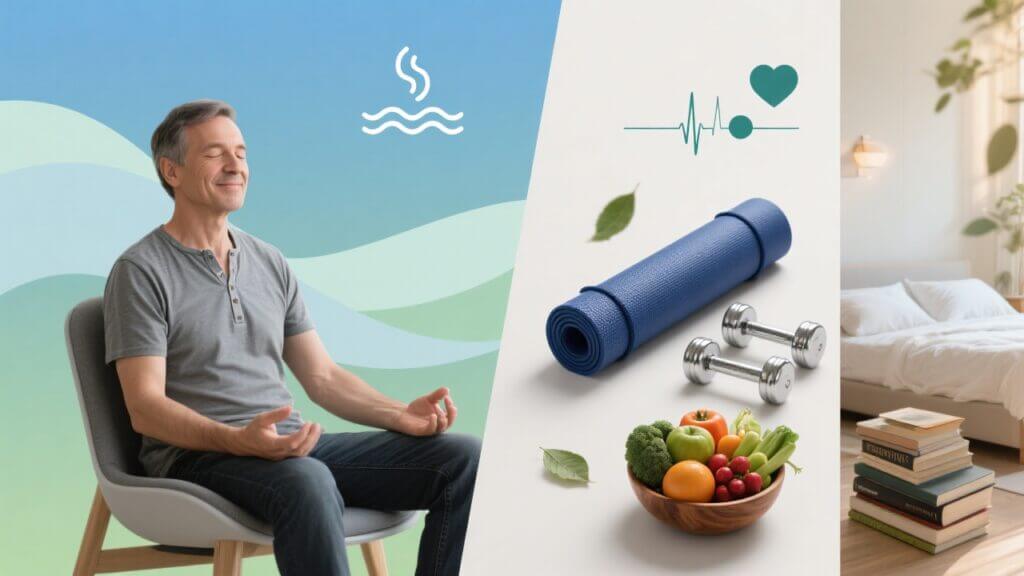
>>Shop Prostate Health Supplement Here<<
Hydration and Fluid Intake
The Water Game: How Smart Hydration Can Transform Your Prostate Health
Here’s a hydration truth bomb that might blow your mind – the way you drink water throughout the day can make or break your prostate comfort. Most guys think it’s simple: drink more water, feel better. But when it comes to your prostate, it’s not just about how much you drink – it’s about when, what, and how you hydrate that really matters.
You’ve probably heard the conflicting advice: “Drink more water for your prostate!” followed by “Don’t drink too much or you’ll be running to the bathroom all night!” So which is it? The answer is both, and neither. It’s actually about finding your hydration sweet spot and timing it right.
Here’s what’s really happening: proper hydration helps flush out toxins, reduces the concentration of irritating substances in your urine, and keeps everything flowing smoothly. But poor hydration habits? They can leave you dealing with concentrated urine that irritates your prostate, or worse – the dreaded cycle of dehydration followed by water overload.
The good news is that once you understand how to hydrate strategically, you can actually use water as a tool to support your prostate health instead of working against it. Ready to master the art of prostate-friendly hydration?
54. Hydration Habits for Prostate Relief
Struggling with frequent nighttime trips to the bathroom? Adjusting your water intake can make a difference. Drinking a small glass of water—around 200 ml—two hours before bedtime helps balance hydration and reduces nighttime urination.
- Evening hydration adjustment
- Reduced nighttime urination
- Improved sleep quality
55. Monitor Urine Color for Hydration
Wondering if you’re drinking enough water? Your urine color is a simple indicator. Aim for clear or pale yellow urine to ensure proper hydration and support prostate health.
- Urine color monitoring
- Hydration assessment
- Prostate health support
56. Limit Caffeine and Alcohol Intake
Enjoying that morning coffee or evening drink? Both caffeine and alcohol can irritate the bladder and worsen prostate symptoms. Reducing their consumption can lead to fewer bathroom trips and better prostate comfort.
- Reduced bladder irritation
- Fewer bathroom trips
- Enhanced prostate comfort
57. Stay Hydrated with Water-Rich Foods
Looking to boost hydration? Incorporate fruits and vegetables like cucumbers, watermelon, and oranges into your diet. These not only hydrate but also provide nutrients that support prostate health.
- Hydrating fruits and vegetables
- Nutrient-rich diet
- Prostate health support
58. Avoid Holding Urine for Too Long
Feeling the urge to go? Delaying urination can increase pressure on the prostate. Responding promptly helps maintain prostate health and reduces discomfort.
- Prompt urination response
- Reduced prostate pressure
- Enhanced comfort
59. Limit Evening Water Intake
Tired of waking up to urinate? Limiting water intake before bedtime can help reduce nighttime trips to the bathroom, leading to better sleep and prostate health.
- Reduced nighttime urination
- Improved sleep quality
- Prostate health support
60. Incorporate Herbal Teas for Hydration
Looking for a hydrating alternative? Herbal teas can be a soothing way to increase fluid intake. Opt for caffeine-free options to avoid bladder irritation.
- Caffeine-free herbal teas
- Soothing hydration
- Bladder-friendly options
61. Cranberries
Rich in antioxidants and anti-inflammatory compounds, cranberries can help support urinary tract health and reduce bacterial infections that may affect the prostate. Fresh cranberries or unsweetened cranberry juice are excellent choices.
- Rich in antioxidants
- Supports urinary tract health
- Reduces bacterial infections
62. Turmeric
This golden spice contains curcumin, a powerful anti-inflammatory compound that may help reduce prostate inflammation and support overall prostate health. Add turmeric to curries, smoothies, or warm milk.
- Contains curcumin
- Reduces inflammation
- Supports prostate health
63. Brazil Nuts
Extremely high in selenium, Brazil nuts provide essential minerals for prostate health. Just 1-2 nuts daily can meet your selenium needs, which may help reduce prostate cancer risk.
- High in selenium
- Meets daily mineral needs
- May reduce cancer risk
64. Watermelon
Contains lycopene and citrulline, which support blood flow and may benefit prostate health. The high water content also helps with hydration and urinary function.
- Contains lycopene and citrulline
- Supports blood flow
- Aids hydration
65. Bell Peppers
Rich in vitamin C and antioxidants, bell peppers help fight oxidative stress and support immune function. Red bell peppers contain the highest levels of beneficial compounds.
- Rich in vitamin C
- High in antioxidants
- Supports immune function
Section Recap
These additional dietary recommendations provide more options for supporting prostate health through nutrition. Incorporating diverse, nutrient-rich foods can offer comprehensive benefits.
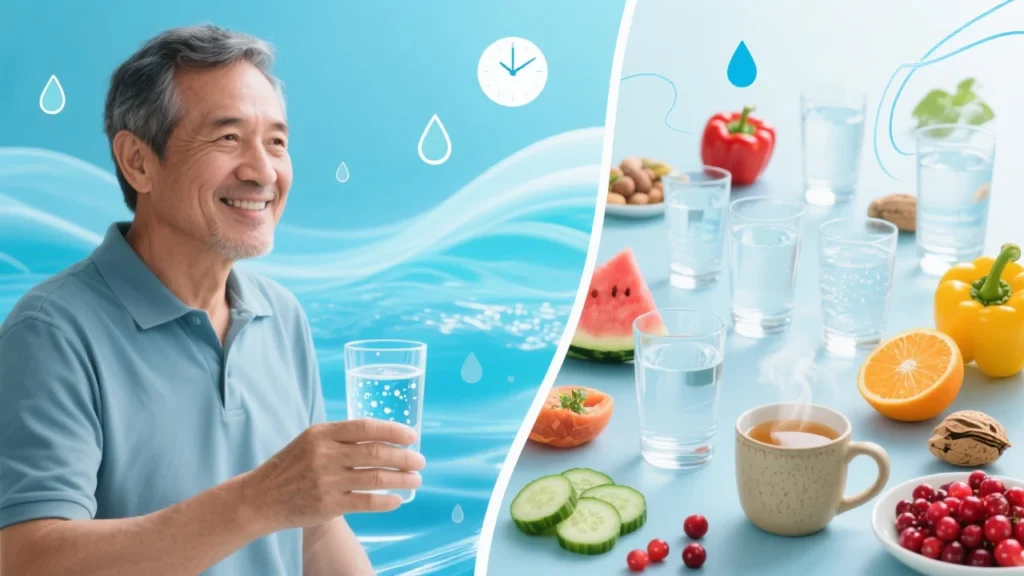
>>Shop Prostate Health Supplement Here<<
66. Cycling
While some worry about cycling and prostate health, moderate cycling can actually benefit circulation and overall fitness. Use a well-fitted bike and take breaks during long rides to reduce pressure on the perineum.
- Benefits circulation
- Improves overall fitness
- Moderate activity recommended
67. Pelvic Stretches
Gentle pelvic stretches can improve flexibility and blood flow to the prostate area. Hip flexor stretches and gentle twists can help reduce tension in the pelvic region.
- Improves flexibility
- Enhances blood flow
- Reduces pelvic tension
68. Interval Training
High-intensity interval training (HIIT) can improve cardiovascular health and may help reduce BPH symptoms. Short bursts of intense activity followed by rest periods can be very effective.
- Improves cardiovascular health
- May reduce BPH symptoms
- Time-efficient exercise
69. Balance Training
Balance exercises help maintain stability and core strength, which indirectly supports pelvic floor health. Simple standing on one foot or using a balance board can be beneficial.
- Maintains stability
- Strengthens core
- Supports pelvic floor
70. Flexibility Training
Regular stretching improves flexibility and can reduce muscle tension that might affect prostate comfort. Focus on hip, lower back, and groin stretches for maximum benefit.
- Improves flexibility
- Reduces muscle tension
- Enhances comfort
Section Recap
Expanding your exercise routine with various activities can provide comprehensive benefits for prostate health. Incorporating cycling, stretching, and balance training offers well-rounded support.
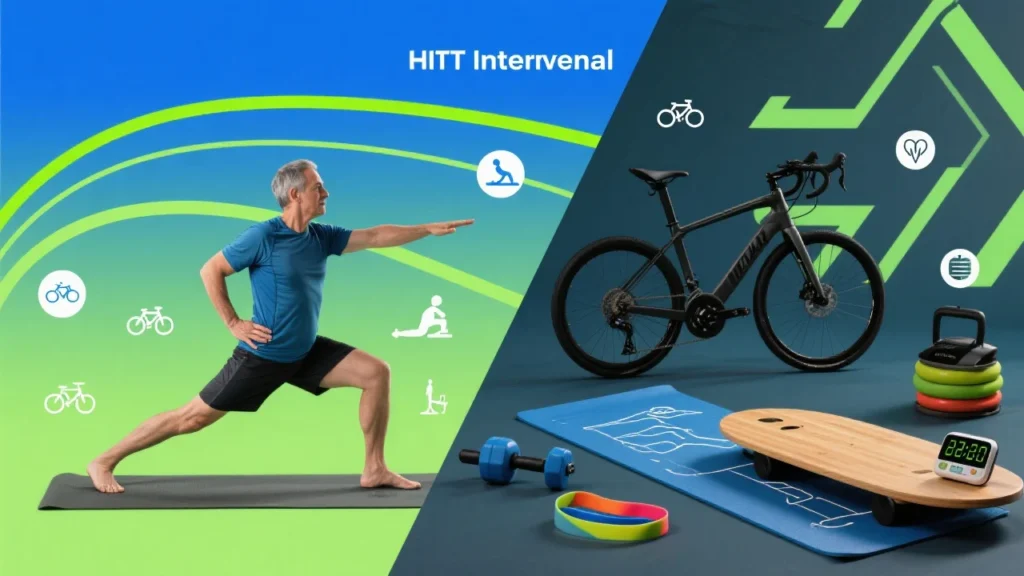
>>Shop Prostate Health Supplement Here<<
71. Temperature Regulation
Avoid excessive heat exposure, such as hot baths or saunas for extended periods, as this may affect sperm production and overall prostate health. Moderate temperatures are best for reproductive health.
- Protects reproductive health
- Maintains optimal temperatures
- Supports prostate function
72. Regular Bowel Movements
Maintaining regular bowel movements prevents constipation, which can put pressure on the prostate. Include fiber in your diet and stay hydrated to support healthy digestion.
- Prevents constipation
- Reduces prostate pressure
- Supports healthy digestion
73. Limit Processed Foods
Processed foods often contain high levels of sodium, preservatives, and unhealthy fats that may contribute to inflammation. Choose whole, unprocessed foods whenever possible for better prostate health.
- Reduces inflammation
- Limits unhealthy additives
- Promotes overall health
74. Avoid Tight Clothing
Tight pants or underwear can restrict blood flow and increase pressure on the prostate area. Choose comfortable, well-fitting clothing that allows proper circulation.
- Improves blood flow
- Reduces pressure
- Enhances comfort
75. Environmental Toxin Awareness
Limit exposure to environmental toxins such as pesticides, heavy metals, and industrial chemicals, which may increase prostate cancer risk. Choose organic foods when possible and use natural cleaning products.
- Reduces toxin exposure
- May lower cancer risk
- Supports overall health
76. Medication Review
Regularly review medications with your healthcare provider, as some drugs can affect prostate function or mask symptoms. Ensure all medications are necessary and discuss alternatives if needed.
- Monitors drug effects
- Identifies potential issues
- Optimizes treatment
Section Recap
These lifestyle modifications focus on daily habits that can significantly impact prostate health. Small changes in clothing choices, food quality, and environmental awareness can make a big difference.
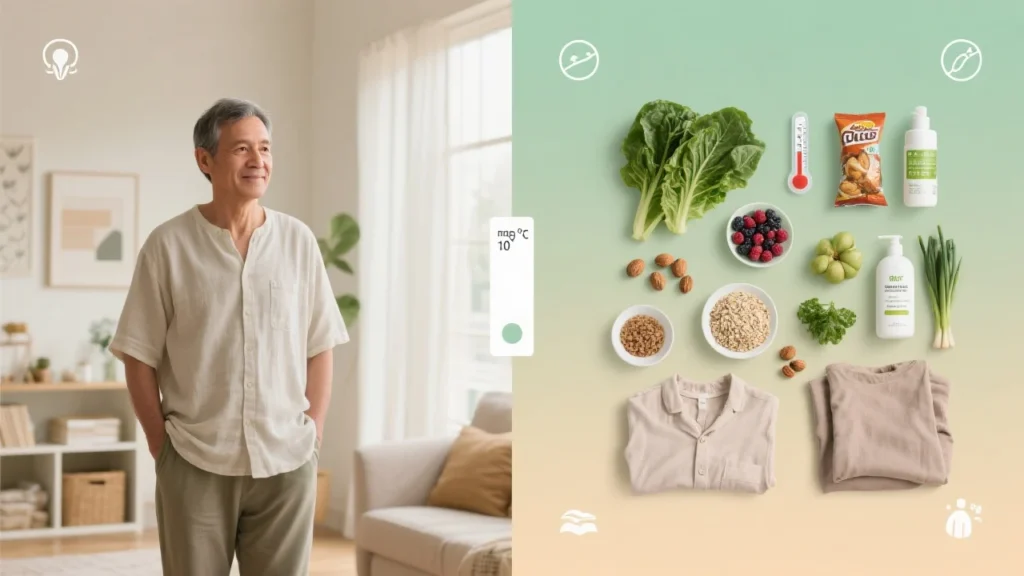
>>Shop Prostate Health Supplement Here<<
77. Genetic Testing
Men with family history of prostate or breast cancer may benefit from genetic testing to assess inherited risk factors. This information can guide screening schedules and prevention strategies.
- Assesses inherited risk
- Guides screening schedules
- Informs prevention strategies
78. Symptom Tracking
Keep a diary of urinary symptoms, including frequency, urgency, and flow strength. This information helps healthcare providers assess changes and adjust treatment plans accordingly.
- Tracks symptom changes
- Helps assess treatment
- Guides medical decisions
79. Second Opinion Consultation
For significant prostate health concerns or treatment decisions, seeking a second opinion can provide additional perspective and ensure you’re making informed choices about your care.
- Provides additional perspective
- Ensures informed decisions
- Confirms treatment plans
80. PSA Velocity Monitoring
Track how quickly PSA levels change over time, not just absolute values. Rapid increases may be more concerning than stable higher levels, helping guide further evaluation needs.
- Monitors PSA changes
- Identifies concerning trends
- Guides further testing
81. Age-Appropriate Screening
Begin discussions about prostate screening at age 50 for average-risk men, or age 45 for high-risk individuals. Regular discussions with healthcare providers ensure appropriate timing and frequency.
- Age-appropriate timing
- Risk-based approach
- Regular healthcare discussions
Section Recap
Enhanced screening approaches and genetic considerations provide more personalized prostate health management. These strategies help optimize detection and prevention efforts.

>>Shop Prostate Health Supplement Here<<
82. Quercetin
This flavonoid found in onions, apples, and berries has anti-inflammatory properties that may help reduce prostate inflammation and improve symptoms of chronic prostatitis.
- Anti-inflammatory properties
- Reduces prostate inflammation
- Found in common foods
83. Rye Grass Pollen Extract
Studies suggest this supplement may help improve urinary symptoms associated with BPH. It’s been used in Europe for decades as a natural treatment for prostate enlargement.
- Improves urinary symptoms
- Natural BPH treatment
- European traditional use
84. African Potato Extract
Also known as Hypoxis rooperi, this traditional remedy has been studied for its potential benefits in managing BPH symptoms and supporting prostate health.
- Traditional remedy
- Manages BPH symptoms
- Supports prostate health
85. Boron Supplementation
This trace mineral may help reduce prostate cancer risk and support healthy testosterone levels. Foods rich in boron include avocados, nuts, and dried fruits.
- May reduce cancer risk
- Supports testosterone levels
- Found in nuts and fruits
86. Vitamin D Optimization
Adequate vitamin D levels are important for prostate health and may help reduce cancer risk. Get tested and supplement if deficient, aiming for optimal blood levels.
- Important for prostate health
- May reduce cancer risk
- Testing recommended
87. Stinging Nettle Leaf
Different from nettle root, the leaf extract may help reduce inflammation and support urinary health. It’s often combined with other prostate-supporting herbs.
- Reduces inflammation
- Supports urinary health
- Often combined with other herbs
Section Recap
These additional supplements and natural remedies offer more options for supporting prostate health. Always consult with healthcare providers before starting new supplement regimens.

>>Shop Prostate Health Supplement Here<<
88. Journaling
Writing down thoughts and feelings can help process stress and emotions, reducing their negative impact on physical health including prostate function. Even 10 minutes daily can be beneficial.
- Processes stress and emotions
- Reduces negative health impact
- Quick daily practice
89. Nature Therapy
Spending time in nature has been shown to reduce stress hormones and promote relaxation. Even a short walk in a park can help lower cortisol levels and support overall health.
- Reduces stress hormones
- Promotes relaxation
- Lowers cortisol levels
90. Music Therapy
Listening to calming music can reduce stress and anxiety, potentially benefiting prostate health by lowering inflammation-causing stress hormones. Create playlists of your favorite relaxing music.
- Reduces stress and anxiety
- Lowers stress hormones
- Easily accessible therapy
91. Box Breathing
This structured breathing technique (inhale for 4, hold for 4, exhale for 4, hold for 4) can quickly activate the relaxation response and reduce stress-related inflammation.
- Structured breathing technique
- Activates relaxation response
- Reduces inflammation
Section Recap
These additional stress management techniques provide more tools for maintaining emotional and physical well-being, which directly impacts prostate health.

>>Shop Prostate Health Supplement Here<<
92. Electrolyte Balance
Maintaining proper electrolyte balance supports kidney function and urinary health. Include natural sources like coconut water or add a pinch of sea salt to your water.
- Supports kidney function
- Maintains urinary health
- Natural electrolyte sources
93. Coconut Water
Rich in potassium and electrolytes, coconut water provides hydration while supporting kidney and bladder function. It’s a natural alternative to sports drinks for maintaining fluid balance.
- Rich in potassium
- Supports kidney function
- Natural hydration source
94. Timing of Fluid Intake
Distribute water intake throughout the day rather than drinking large amounts at once. This helps maintain steady hydration while reducing sudden urges to urinate.
- Steady hydration maintenance
- Reduces sudden urges
- Better bladder control
Section Recap
Optimizing hydration goes beyond just drinking water. Proper timing and electrolyte balance contribute to overall urinary and prostate health.
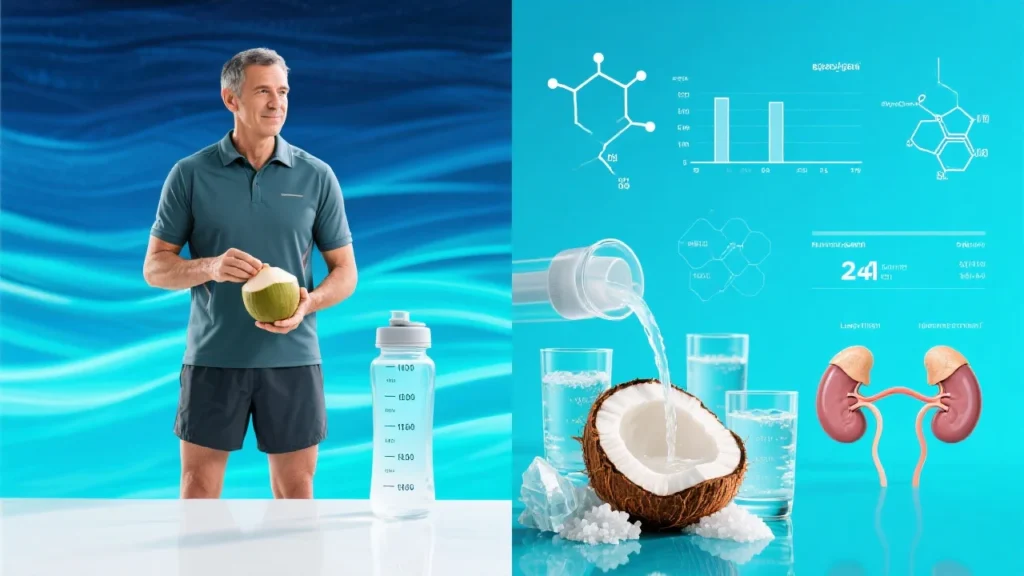
>>Shop Prostate Health Supplement Here<<
Sleep and Recovery
Sleep Your Way to Better Prostate Health: Why Your Pillow Time Actually Matters
Here’s something most guys don’t connect – those restless nights and your prostate health are having a serious conversation behind the scenes. When you’re tossing and turning or only getting a few hours of shut-eye, your body’s hormone factory goes haywire. We’re talking about testosterone levels that swing like a pendulum and inflammation that cranks up like a thermostat stuck on high.
Think about it: your body does its most important repair work while you sleep. That’s when hormones get balanced, inflammation gets dialed down, and your prostate gets the recovery time it desperately needs. But when sleep is garbage? Your prostate is basically trying to function on empty while dealing with a hormonal storm.
The frustrating part is that prostate issues can mess with your sleep, and poor sleep can mess with your prostate – it’s like being stuck in a cycle that feeds on itself. Maybe you’re waking up multiple times to use the bathroom, or stress about prostate health is keeping your mind racing at 2 AM.
But here’s the encouraging news: improving your sleep quality is one of the most powerful things you can do for your prostate, and it doesn’t require expensive treatments or complicated protocols. Ready to discover how to turn your bedroom into a prostate-healing sanctuary?
95. Sleep Quality Optimization
Aim for 7-9 hours of quality sleep nightly to support hormone production and cellular repair. Poor sleep can disrupt testosterone levels and increase inflammation, potentially affecting prostate health.
- Supports hormone production
- Enables cellular repair
- Reduces inflammation
96. Sleep Hygiene
Maintain consistent sleep and wake times, keep the bedroom cool and dark, and avoid screens before bedtime. Good sleep hygiene promotes restorative sleep essential for prostate health.
- Consistent sleep schedule
- Optimal sleep environment
- Promotes restorative sleep

Sexual Health
The Connection You Need to Know: How Your Sex Life and Prostate Health Go Hand in Hand
Let’s talk about something that doesn’t get discussed enough in doctor’s offices – your sexual health and prostate health are basically best friends. They’re so intertwined that what affects one almost always impacts the other. And here’s the kicker: maintaining a healthy sex life isn’t just good for your relationship or confidence – it’s actually therapeutic for your prostate.
Think of it this way: regular sexual activity is like a natural maintenance program for your prostate. It helps with circulation, reduces congestion, and keeps everything functioning the way it should. On the flip side, when sexual health takes a hit, your prostate often feels it too, and vice versa.
But here’s where it gets tricky – prostate issues can mess with sexual function, creating anxiety that makes everything worse. It’s like a domino effect that can leave guys feeling frustrated and worried about both aspects of their health. The good news? Understanding this connection is the first step to addressing both.
We’re not just talking about frequency here – we’re talking about overall sexual wellness, communication with your partner, and recognizing when changes might signal something worth paying attention to. Ready to explore how taking care of your sexual health can be one of the best things you do for your prostate?
97. Regular Sexual Activity
Regular ejaculation through sexual activity or masturbation may help clear the prostate of potentially harmful substances and reduce cancer risk. Maintain a healthy, active sex life as part of overall wellness.
- Clears potentially harmful substances
- May reduce cancer risk
- Supports overall wellness
98. Communication with Partner
Open communication about any changes in sexual function can reduce stress and strengthen relationships. Partner support is crucial for managing prostate health challenges and maintaining intimacy.
- Reduces stress
- Strengthens relationships
- Maintains intimacy

Medical Partnership
Your Prostate Health Team: Why the Right Doctor Relationship Changes Everything
Here’s the reality check most guys need to hear – having a good relationship with your healthcare provider isn’t just nice to have when it comes to prostate health, it’s absolutely essential. We’re talking about the difference between catching issues early when they’re manageable versus dealing with problems that could have been prevented or treated much more easily.
Think about it: your prostate doesn’t come with a dashboard warning light. You can’t just pop the hood and see what’s going on. That’s where having a healthcare provider who knows you, your history, and your concerns becomes invaluable. They’re not just there for when things go wrong – they’re your early warning system and your game plan strategist.
But let’s be honest – a lot of guys treat doctor visits like going to the dentist. You show up when something hurts, answer questions with one-word responses, and hope to get out as quickly as possible. When it comes to prostate health, that approach can cost you big time.
The good news? Building a solid relationship with your healthcare team doesn’t mean becoming best friends or oversharing every detail of your life. It’s about creating a partnership where you feel comfortable asking questions, discussing concerns, and working together on a proactive plan. Ready to discover how to build the kind of healthcare relationship that keeps your prostate health on track?
99. Regular Check-ups
Schedule annual check-ups with your healthcare provider to monitor prostate health, discuss symptoms, and review risk factors. Early detection and intervention are key to maintaining prostate wellness.
- Monitors prostate health
- Enables early detection
- Reviews risk factors
100. Specialist Consultation
Consider consulting a urologist for specialized prostate care, especially if you have symptoms or risk factors. Specialists can provide targeted treatment options and advanced screening methods.
- Specialized prostate care
- Targeted treatment options
- Advanced screening methods
101. Stay Informed
Keep up with the latest research and recommendations for prostate health. Stay informed about new treatment options, screening guidelines, and lifestyle recommendations to make empowered health decisions.
- Latest research awareness
- New treatment knowledge
- Empowered health decisions
Final Section Recap
These final tips emphasize the importance of sleep, sexual health, and medical partnership in comprehensive prostate care. Taking a holistic approach ensures the best outcomes for long-term prostate wellness.
Your Prostate Health Journey Starts Now
Caring for your prostate health is essential for your overall well-being. By implementing these 101 tips—ranging from dietary adjustments to stress management techniques—you can take proactive steps towards maintaining a healthy prostate. Remember, early detection through regular screenings can make a significant difference.

Frequently Asked Questions:
What is the main difference between prostate health and prostate cancer?
Prostate health refers to the overall well-being and proper functioning of the prostate gland, which includes maintaining normal size, hormone levels, and urinary function. Prostate cancer, on the other hand, is a disease characterized by the uncontrolled growth of abnormal cells within the prostate gland, potentially leading to serious health complications. Maintaining good prostate health can help reduce the risk of developing prostate cancer.
How can diet influence prostate health?
A balanced diet rich in fruits, vegetables, whole grains, and healthy fats can support prostate health. Specifically, consuming foods high in antioxidants, such as tomatoes (rich in lycopene) and cruciferous vegetables like broccoli and cauliflower, may help reduce the risk of prostate issues.
What role does exercise play in maintaining prostate health?
Regular physical activity, such as brisk walking or cycling, can help maintain a healthy weight and reduce inflammation, both of which are beneficial for prostate health. Aim for at least 30 minutes of moderate exercise most days of the week.
Are there supplements that can improve prostate health?
Some supplements, like saw palmetto, have been studied for their potential benefits in managing benign prostatic hyperplasia (BPH) symptoms. However, evidence is mixed, and such supplements should not replace professional medical advice. It’s important to consult with a healthcare provider before starting any supplement regimen.
How does smoking affect prostate health?
Smoking has been linked to an increased risk of developing aggressive forms of prostate cancer. Quitting smoking can improve overall health and may reduce the risk of prostate-related issues.
What are the recommended screenings for prostate health?
Regular screenings, such as the prostate-specific antigen (PSA) blood test and digital rectal exam (DRE), are recommended to monitor prostate health. Men at average risk should consider starting screenings at age 55, while those at higher risk may begin earlier. Discuss with your healthcare provider to determine the appropriate screening schedule for you.
Can stress impact prostate health?
Chronic stress can negatively affect overall health, including prostate health, by influencing hormonal balance and immune function. Managing stress through techniques like meditation, deep-breathing exercises, and regular physical activity can be beneficial.
>>Shop Prostate Health Supplement Here<<
Spencer is a distinguished freelance medical writer with 15 years of experience, primarily focused on product reviews. Hailing from the field of healthcare, he combines in-depth medical knowledge with a conversational writing style, making complex topics accessible and engaging. Renowned for his thorough research and commitment to accuracy, Spencer’s work is a valuable resource in the medical community. His ability to distill intricate medical information into clear, concise reviews has made wysehealth.com a go-to site for reliable health product insights, reflecting his dedication to empowering readers with informed health decisions.

